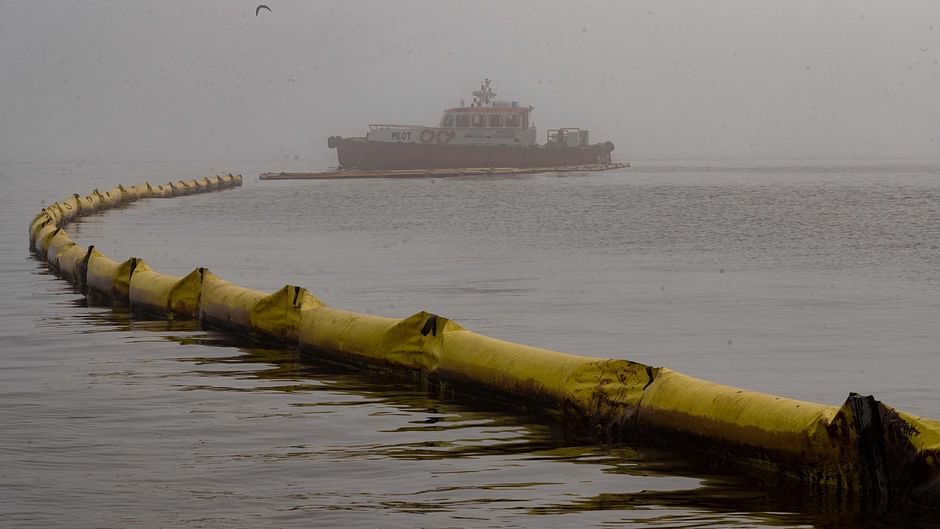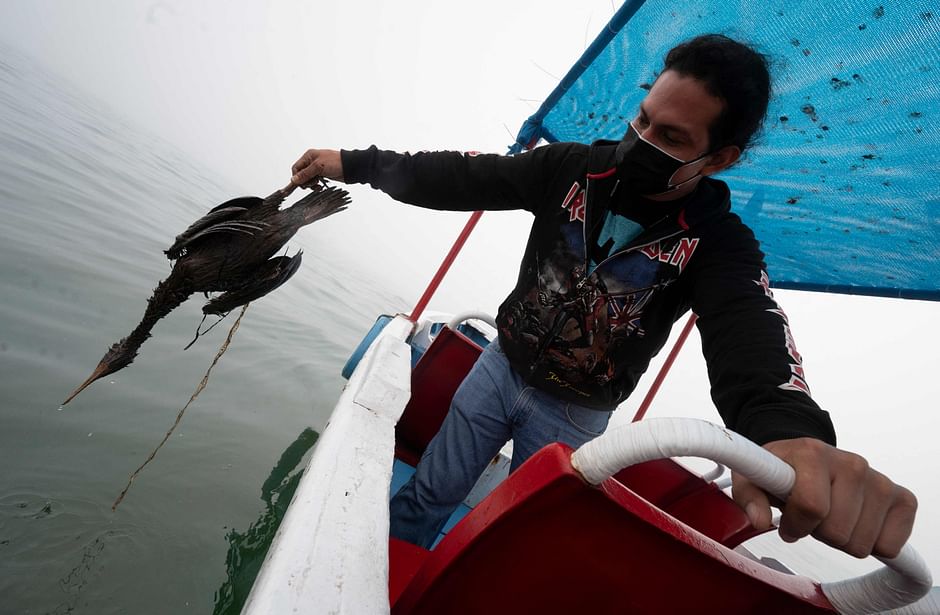AFP Ancon, Peru
Published: 21 Jan 2022, 2

Floating barriers to protect the beaches from drifting oil are seen at the resort town of Ancon, Peru, on 21 January, 2022AFP
At Miramar Beach in Peru's popular resort of Ancon, there are no bathers despite the summer heat. Instead, it teems with workers in coveralls cleaning up an oil spill.
Almost a million liters (264,000 gallons) of crude spilled into the sea on Saturday when a tanker was hit by waves while offloading at La Pampilla refinery in Ventanilla, 30 kilometres (19 miles) north of Lima.
Its owner, Spanish oil company Repsol, attributed the accident to the swell caused by the volcanic eruption in Tonga, thousands of miles away.
"Oil reaches the beach during high tide at night... and deposits the oil on the shore," Martin Martinez of the NGO AMAAC Peru, supervising the cleanup, told AFP.
"We take advantage to remove it from the sea, that and the saturated sand," he said.
The spill has dealt a blow to tourism in the popular resort, and to businesses who make most of their money in the summer season.
"There were many people until Sunday; the stain arrived on Monday, and since then, no one is swimming anymore," said 48-year-old Richard Gutierrez, who has a food and soda stand on Miramar beach.

A man picks up an oil-soaked dead Cormoran from the sea on the resort town of Ancon, Peru, on 21 January, 2022AFP
"We cannot sell anything, there are no vacationers, there is no one" apart from about 100 cleanup workers -- soldiers, Repsol hired hands and volunteers -- removing the polluted sand with spades to be taken to a toxic waste treatment facility.
Advertisement
'Ecological disaster'
Peru's government has declared the spill of some 6,000 barrels of oil an "ecological disaster" and has demanded compensation from Repsol.
The company denies responsibility, saying maritime authorities had issued no warning of freak waves after the Tonga eruption.
The task, which began Tuesday, is an arduous one.
The workers deposit the polluted sand onto blue tarps, which are dragged to a pile further inland, awaiting removal to another site.
Work begins at 8:00 am and finishes at 6:00 pm, with a 30-minute break for lunch.
No one knows how long it will take to clean up the affected stretch of coastline, but in Miramar, it is estimated it will last at least two weeks.
The environment ministry said 174 hectares -- equivalent to 270 football fields -- of coast were affected, and some 118 hectares at sea.
Marine currents have dispersed the oil all the way to the coast of Chancay district, more than 40 kilometers from where the spill occurred.
The health ministry has identified 21 affected beaches and warned bathers to stay away.
The spill has also affected hundreds of artisanal fishermen who operate on the central Peruvian coast.
They rely on catches of sole, lorna drum and Peruvian grunt -- fish commonly used in the local delicacy ceviche, a marinated raw fish dish Peru is famous for.
Traditional fishermen in despair over Peru oil spill
By AFP
Published January 20, 2022
Hundreds of traditional fisherman living just outside the Peruvian capital fear their livelihoods are ruined following an oil spill caused by a volcanic eruption thousands of miles away.
Authorities called the spill, caused by an eruption on the other side of the Pacific near Tonga, the worst ecological disaster in Lima in recent times.
Traditional fisherman in Ventanilla, a district to the north of Lima’s port in Callao, on Wednesday protested outside the gates of the Pampilla Refinery owned by Spanish energy giant Repsol, demanding compensation for the spill that occurred as freak waves hit a tanker during offloading on Saturday.
“How will we live now? That’s our worry,” Miguel Angell Nunez, who led the protest, told AFP.
“We’ve lost our source of work and we don’t know when this will end.
“We want them to recognize the damage. The spill was caused by (Repsol’s) negligence.”
It is an area teeming with sole, lorna drum and Peruvian grunt, commonly used in the local delicacy ceviche, a marinated raw fish dish that Peru is famous for.
Traditional fishermen use small scale, low technology, low capital practices, mostly from the beach or rocks.
The few that own small boats only travel short distances along the shoreline.
– ‘Catastrophe’ –
The Ventanilla spill sent 6,000 barrels of oil into the sea.
The environment ministry said 174 hectares — equivalent to 270 football fields — of sea, beaches and natural reserves were affected.
The attorney general’s office said the spill had “put at risk flora and fauna in two protected areas.”
Authorities pulled dead fish and birds covered in oil out of the sea, and had to seal off three beaches, meaning hundreds of fishermen had nowhere to go to work.
Refinery officials said they had erected “containment barriers that cover all of the affected zones and brigades with specialist sea and land teams have been deployed.”
But fishermen, some of whom live hand to mouth, fear that they could be prevented from working for years.
Around 1,500 traditional fisherman work in the area, usually earning between 50 and 120 soles ($12-$30) a day from their catch.
“This catastrophe won’t last one or four months. It will last years,” fisherman Roberto Carlos Espinoza told AFP.
“Today we don’t have work, what are we going to do?”
Espinoza blames Repsol for “lacking a contingency plan” for the damage to flora and fauna.
The spill has spread to beaches in neighboring districts where authorities have found dead sea lions and penguins.
The health ministry said 21 beaches have been affected and warned bathers not to visit them.
– ‘Tough and toxic work’ –
Repsol work teams wearing white suits, boots and gloves were removing oil from beaches and crags on the Cavero beach in Ventanilla on Wednesday.
Workers use dustpans, shovels and long sponges to soak up the oil that cloaks the beach and gives off a pungent stench, while the navy guards the area.
Toiling in the summer sun, they tip the collected oil into barrels and plastic bags.
“It’s not easy to work with this (oil) but unfortunately we have to work,” said Giancarlo Briseno.
“The work is tough, quite toxic and burns your face,” added Pedro Guzman.
Former environment minister Fabiola Munoz said it would take two years to clean up the spill.
The public prosecutor has opened an investigation for environmental pollution against the refinery.
It said the owners could face a fine of up to $34.5 million.
“The State will be inflexible,” warned Environment Minister Ruben Ramirez.
Tine van den Wall Bake Rodriguez, Repsol Peru’s spokeswoman, said “we cannot say who is responsible” for the oil spill, which the company has blamed on the freak waves.
“We are extremely affected” by it, she added.
The Pampilla refinery has the capacity to process 117,000 barrels a day, which represents more than half of Peru’s total oil output.
By AFP
Published January 20, 2022
Hundreds of traditional fisherman living just outside the Peruvian capital fear their livelihoods are ruined following an oil spill caused by a volcanic eruption thousands of miles away.
Authorities called the spill, caused by an eruption on the other side of the Pacific near Tonga, the worst ecological disaster in Lima in recent times.
Traditional fisherman in Ventanilla, a district to the north of Lima’s port in Callao, on Wednesday protested outside the gates of the Pampilla Refinery owned by Spanish energy giant Repsol, demanding compensation for the spill that occurred as freak waves hit a tanker during offloading on Saturday.
“How will we live now? That’s our worry,” Miguel Angell Nunez, who led the protest, told AFP.
“We’ve lost our source of work and we don’t know when this will end.
“We want them to recognize the damage. The spill was caused by (Repsol’s) negligence.”
It is an area teeming with sole, lorna drum and Peruvian grunt, commonly used in the local delicacy ceviche, a marinated raw fish dish that Peru is famous for.
Traditional fishermen use small scale, low technology, low capital practices, mostly from the beach or rocks.
The few that own small boats only travel short distances along the shoreline.
– ‘Catastrophe’ –
The Ventanilla spill sent 6,000 barrels of oil into the sea.
The environment ministry said 174 hectares — equivalent to 270 football fields — of sea, beaches and natural reserves were affected.
The attorney general’s office said the spill had “put at risk flora and fauna in two protected areas.”
Authorities pulled dead fish and birds covered in oil out of the sea, and had to seal off three beaches, meaning hundreds of fishermen had nowhere to go to work.
Refinery officials said they had erected “containment barriers that cover all of the affected zones and brigades with specialist sea and land teams have been deployed.”
But fishermen, some of whom live hand to mouth, fear that they could be prevented from working for years.
Around 1,500 traditional fisherman work in the area, usually earning between 50 and 120 soles ($12-$30) a day from their catch.
“This catastrophe won’t last one or four months. It will last years,” fisherman Roberto Carlos Espinoza told AFP.
“Today we don’t have work, what are we going to do?”
Espinoza blames Repsol for “lacking a contingency plan” for the damage to flora and fauna.
The spill has spread to beaches in neighboring districts where authorities have found dead sea lions and penguins.
The health ministry said 21 beaches have been affected and warned bathers not to visit them.
– ‘Tough and toxic work’ –
Repsol work teams wearing white suits, boots and gloves were removing oil from beaches and crags on the Cavero beach in Ventanilla on Wednesday.
Workers use dustpans, shovels and long sponges to soak up the oil that cloaks the beach and gives off a pungent stench, while the navy guards the area.
Toiling in the summer sun, they tip the collected oil into barrels and plastic bags.
“It’s not easy to work with this (oil) but unfortunately we have to work,” said Giancarlo Briseno.
“The work is tough, quite toxic and burns your face,” added Pedro Guzman.
Former environment minister Fabiola Munoz said it would take two years to clean up the spill.
The public prosecutor has opened an investigation for environmental pollution against the refinery.
It said the owners could face a fine of up to $34.5 million.
“The State will be inflexible,” warned Environment Minister Ruben Ramirez.
Tine van den Wall Bake Rodriguez, Repsol Peru’s spokeswoman, said “we cannot say who is responsible” for the oil spill, which the company has blamed on the freak waves.
“We are extremely affected” by it, she added.
The Pampilla refinery has the capacity to process 117,000 barrels a day, which represents more than half of Peru’s total oil output.
No comments:
Post a Comment